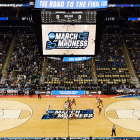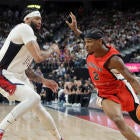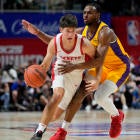The NCAA approved a proposal Wednesday from its men's basketball rules committee to extend the 3-point line more than a foot deeper than its current positioning.
The rule will move the line back from 20 feet, 9 inches to 22-1¾, the same measurement used in international play. The 20-9 distance has been in place since 2008 in NCAA men's basketball.
There have been measures taken by the NCAA to gauge the success of such a change in recent years. In the 2018 and 2019 NIT Tournament, one of many experimental rules was the deepening of the 3-point line to the international distance. Results from the 2019 NIT experiment showed teams took more 3-point shots and shot a slightly lower percentage compared to their regular-season averages.
The committee's goal in exploring such a change, according to the NCAA, is based off three objectives:
- Making the lane more available for dribble/drive plays from the perimeter.
- Slowing the trend of the 3-point shot becoming too prevalent in men's college basketball by making the shot a bit more challenging, while at the same time keeping the shot an integral part of the game.
- Assisting in offensive spacing by requiring the defense to cover more of the court.
"After gathering information over the last two seasons, we feel it's time to make the change," said Tad Boyle, committee chair and coach at Colorado. "Freedom of movement in the game remains important, and we feel this will open up the game. We believe this will remove some of the congestion on the way to the basket."
Other rules changes for this season include:
- To reset the shot clock reset to 20 seconds after a field goal attempt hits the rim and the offensive team rebounds the ball in the front court.
- The use of instant replay can be conducted if a basket interference or goaltending call has been made during the last two minutes of the second half or the last two minutes of any overtime
- The allowance for coaches to call live-ball timeouts in the last two minutes of the second half or of any overtime
- Players will be assessed a technical foul and ejection if they use derogatory language aimed at an opponent regarding race, ethnicity, religion, gender, sexual orientation or disability.

















